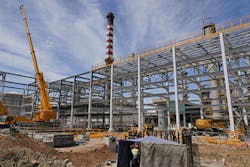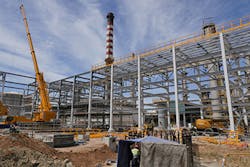Cepsa Upgrades LAB Plant With Detal Technology
The Puente Mayorga Chemical Plant is being upgraded to make it the first in the world to replace HF technology with the Detal system.
Cepsa is upgrading one of its most emblematic chemical plants, located in Puente Mayorga (Cadiz, Spain), making it the first linear alkyl benzene (LAB) facility in the world to replace hydrofluoric (HF) technology with the Detal process, according to the company. Cepsa presented the project at CESIO 2019, the international surfactant congress. With an investment of €100 million, Cepsa plans to revitalize the plant, reportedly making it the first in Europe and the second in the world to use the fixed-bed Detal catalyst (the first plant to use the technology was the company's Canadian facility, according to Cepsa).
The new plant will be completed in 2020. The new technology will allow production of all commercial LAB grades (high and low 2-phenyl) in the same installation, with flexibility, depending on the demand. Detal technology, in addition to improving the quality of the product, will increase the efficiency of the plant and reduce its emissions, since it requires lower consumption of natural gas and electricity, according to Cepsa.
Digital transformation programs designed by the company will also be installed. The YET (yield, energy and throughput) system, an artificial intelligence program, and the application of industry 4.0 technologies (machine learning, big data and advanced analytics), will optimize processes and reportedly improve the plant's energy efficiency.
Th process will also allow the plant’s LAB production capacity to increase by 50,000 tons (a 25% increase), with the aim of supplying the growing consumption of emerging economies in Africa. The company estimates that between now and 2035, the demand for LAB in these countries will grow by 5% annually.
LAB is the precursor to linear alkylbenzene sulfonate (LAS), the world's most widely used biodegradable surfactant in laundry detergents. LAS was launched more than half a century ago and its properties make it a necessary ingredient both in traditional detergent formats (powder or detergent bars) and in more sophisticated products (single-dose capsules or high-concentration liquid detergents), according to Cepsa.
Cepsa’s chemicals unit has plants in Germany, Brazil, Canada, China, Spain and Indonesia, and markets its products worldwide. The company manufactures raw materials such as LAB and cumene and is reportedly the world’s second largest producer of phenol and acetone.
For more information, visit: www.cepsa.com

